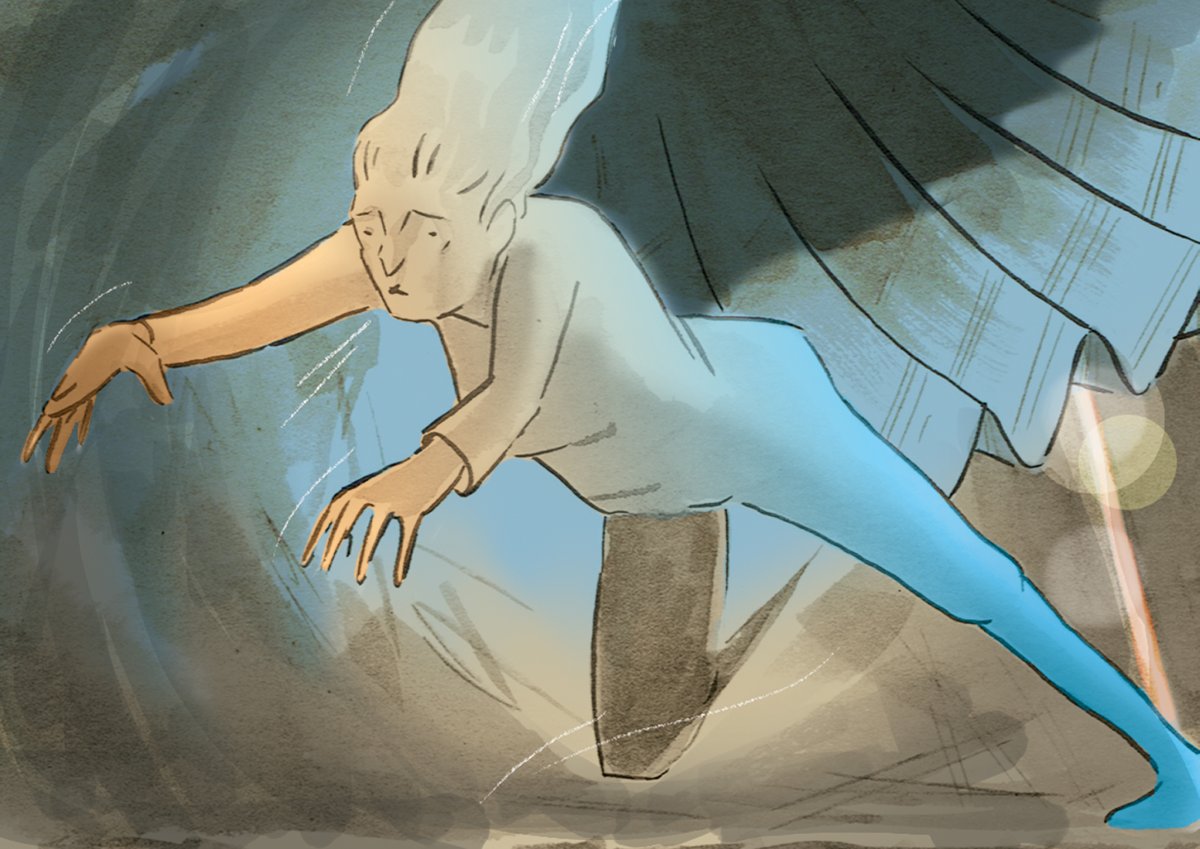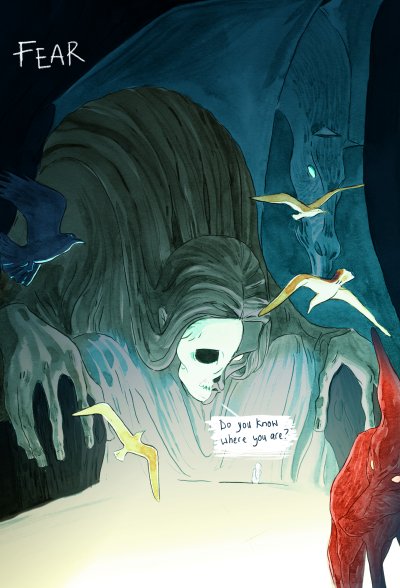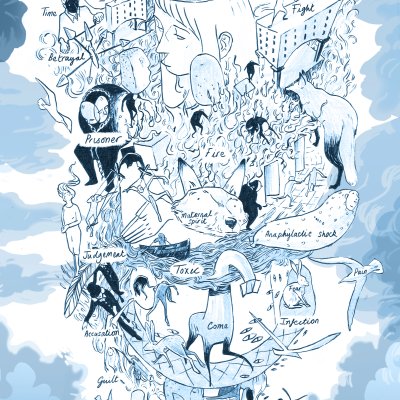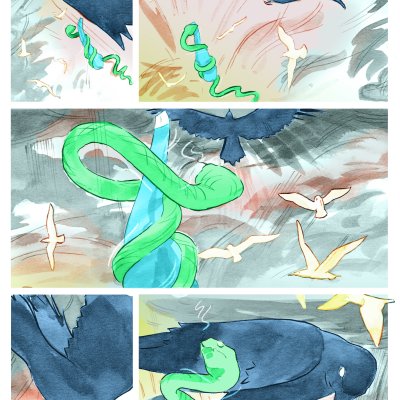In 2013, I was at a point where my career was beginning to take off again. I was an artist who had tinkered around the edges of illustration and travelled abroad to lead some comics workshops. At 42, after a long stretch of putting my children front and center, I could travel away from them for work. I had a lot of plans.
In May that year, my mom was in hospital, so I travelled 200 miles from where I live in Brighton in England to see her. I think she was waiting for me to get there, because a few days later, she sadly died. I developed a sore throat during that time, and the morning my mom died, my fever broke and I felt absolutely leaden. When I was organizing my mom's funeral I just felt awful, but I managed to limp my way through it.
At the time I just thought I had a throat infection. But I remember after I returned from the funeral, I took my kids swimming and I couldn't manage more than two lengths of the pool.
A few days later, on Wednesday May 22, I took my kids to school, came home and went straight to bed. I could feel pain all the way down my neck, pooling in my a**. I remember tweeting that my pain in the neck was becoming a pain in the a**. I thought it was funny.
But by 11am I was writhing in pain and had to call my doctor. She checked me over and said I seemed fine, but I had no blood tests and was sent home with painkillers. They made absolutely no difference.
I've never ever had pain like that. It was like white heat; just off the scale. Eventually an ambulance came at about 9pm to take me to the Emergency Room (ER). I was tested and scanned and kept in for observation overnight, but no painkiller touched the pain. The scans and bloods were also inconclusive. I remember telling my husband Dan that I had noticed a skin discolouration that had spread and was covering my thigh. I think that conversation probably saved my life.
The next day the doctors figured out that I had Necrotizing Fasciitis, a rare bacterial infection that destroys tissue, mine actually developed into Necrotizing Myositis which affects the muscle. I had textbook symptoms but by that point the sepsis was taking hold and I had drifted off into this other space. I had delirium and was hallucinating. I was terrified.

Doctors then performed surgery, trying to save my leg from the infection. But by Friday I was bleeding out and my husband was told I wouldn't survive unless they removed my leg at the hip. I can actually recall seeing myself bleeding out from above during what I now understand to have been an out of body experience.
It wasn't until the following Wednesday that doctors realized the infection was still marching on through my body. It was make or break. In the end surgeons had to remove my glute muscle right up to the small of my back and investigate up my spine. I didn't know at the time, but a nurse who treated me said that I was the sickest patient she'd ever treated who had survived. I had no idea I was dying.
I was in a medically induced coma during that time, and it felt like I was in a kind of purgatory. I was seeing medieval skeletons spiralling across my line of vision. One night, I had "woken up" in the dark and while I knew it wasn't a dream, I also knew I wasn't fully awake. I didn't have anything other than peripheral vision but I recall seeing a light travelling across my line of sight—doctors were probably opening my eyes and shining a light in. Soon after, nurses came in. I saw them with half their faces as skulls.
There was a narrative to the hallucinations, which was that I was the perpetrator of a murder. I had killed the person I had seen bleeding out during my out of body experience. The nurse who was watching me was this woman's mother. In my mind, I had killed this nurse's daughter and she was treating me, and therefore was going to be torturing me and threatening my children in return.
My children came in on the day that doctor's didn't think I was going to make it, and at that point, everything changed. I started being frightened for them. Everything then was about protecting them from the threat I could sense. I had been frightened for myself up until then; I believed I was being constantly watched. The "keep out" signs on the curtains were red eyes to me—I saw eyes everywhere.
At one point in my hallucinations I ended up in ancient China; I had been in Liverpool's Chinatown recently researching for a book. The coma visions were a soup of deep memory, recent memory and the present; what people were saying and the emotion in the room.
I remember that I had a sense that before I could get out of this coma, I had to admit to something. I think it was understood that I wasn't guilty of murder but there was a requirement to confess. The doctors must have wondered what was happening, because I can remember crying out, "OK! I owe Emily ten pounds!"



After 15 days, I woke from my coma. I spent six weeks in that intensive care unit and two weeks in another ward before I was moved to a specialist burn unit where I had to have extensive skin grafts. I was in hospital for about three and a half months in total, I didn't return home until September 10.
I spent the first three months at home sobbing. I had been an energetic, ambitious, independent woman and now I was stuck on one floor, I couldn't get in and out of the house on my own and I had to transfer from a wheelchair to a zimmer frame to go to the toilet. It was like being in a windstorm, my whole life got blown apart.
As an artist, I am a visual person, and I visualized the route back to "normality." It was a pothole ridden road with steep jagged sides. That journey was very slow. My wound was fragile and I couldn't get a prosthetic leg—we tried. I had to slowly come to terms with being an amputee and with my disability, because I didn't want to be recategorized.
I remember lying on the bed with my youngest son Ted when I first came home, he was sobbing and asking if we would ever be able to do certain things again. There had to be honesty there, because I just didn't know. We have adapted as a family but I still can't change a lightbulb or carry a cup of tea across the room.
At first, I couldn't bear being stared at because I felt so broken. But people stared all the time. Some have said that I should feel lucky. But I know what I had before and I know what I have now, and I was grateful before.
One male nurse even asked what my husband thought and said that not many men would stay with me. I didn't say anything at the time because during my healing I didn't think it would be good for me to be angry. But when people say the wrong things, it sticks with you.
Eventually, I slowly started back on a creative project I had been working on before I lost my leg, but at first, I just wanted to draw comics that were silly and made me smile. I did attempt to process my experience through art in 2016 but I wasn't quite ready. I had too much anger and emotion. Instead, I began experimenting by looking at other artists and getting back my creative confidence. Originally I was just going to depict my hallucinations in comic form, but then I started looking at Dan's diary from the time. A friend had suggested he write it to process his emotions and for years, I had sobbed every time I read it. But through reading it again, I could see that he was mentioning things that I had a clear memory of, so I was able to plot the memories I had of hallucinations and talk to people he mentioned to create a narrative for the comic.

I always felt it was an extreme experience but it was proportionate to what was happening physically. When I woke up and I saw what had happened to my body, there was a relief in a way. The evidence was there. Having Dan's diary to witness those weeks meant I also wasn't alone in the experience. He bore witness to it as well.
The second version of the comic was finished in December of 2018. There was definitely closure. I had questions and I thought by creating a comic that depicted this time, I would get answers. And I have.
For example, I now know that the circus ninjas I saw in my hallucinations were surgeons, and I didn't know that until I drew them in the comic with the understanding of what was happening at the time. I also didn't know until I had the comic in my hand and was flipping through it that I had been absorbing the emotions in the room.
I'm an artist taking people on an intensely personal journey but I'd also like the comic to create more awareness around diagnosis of Necrotising Fasciitis.
I don't bear a grudge because having negative energy wouldn't have healed me, but I did meet quite a few people who didn't have a lot of empathy and felt that I should have been able to just bounce back. I think the comic shows: this is why I wasn't able to bounce back. I think people feel awkward around disability and so, for a long time, I would try to make people feel comfortable about my physical self. Now, I don't even think about it when I enter a room.
People say I'm brave. I'm not brave. I had no control at any point with how I felt or reacted. What I do have now is dignity. I've had some of the most excruciating, embarrassing and vulnerable moments, but over time, I've learned that you can get beyond anything.
Zara Slattery is an artist living in Brighton. Her book COMA is available now through Myriad Editions. You can find out more about her work at zaraslattery.com or follow her on Instagram @zaraslattery or Twitter @inksplattery.
All views expressed in this article are the author's own.
As told to Jenny Haward.
Uncommon Knowledge
Newsweek is committed to challenging conventional wisdom and finding connections in the search for common ground.
Newsweek is committed to challenging conventional wisdom and finding connections in the search for common ground.
About the writer
To read how Newsweek uses AI as a newsroom tool, Click here.








